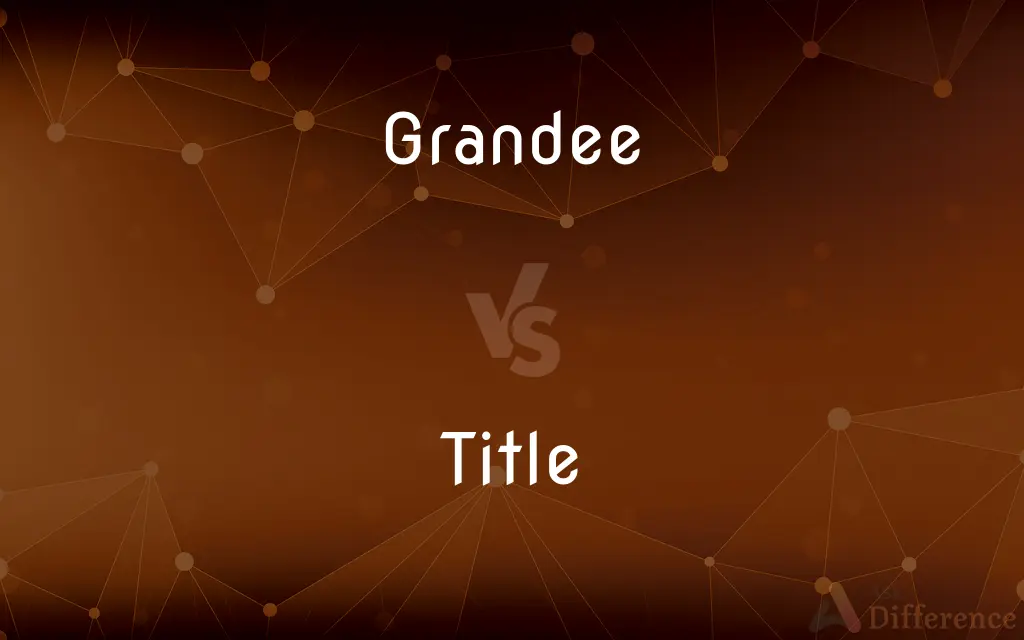Grandee vs. Title — What's the Difference?

Difference Between Grandee and Title
ADVERTISEMENT
Compare with Definitions
Grandee
Grandee (; Spanish: Grande de España, Spanish: [ˈɡɾande]) is an official aristocratic title conferred on some Spanish nobility. Holders of this dignity enjoyed similar privileges to those of the peerage of France during the Ancien Régime, though in neither country did they have the significant constitutional political role the House of Lords gave to the Peerage of England and later Peerage of the United Kingdom.
Title
A title is one or more words used before or after a person's name, in certain contexts. It may signify either generation, an official position, or a professional or academic qualification.
Grandee
A nobleman of the highest rank in Spain or Portugal.
Title
The name of a book, composition, or other artistic work
The author and title of the book
Grandee
Used as the title for such a nobleman.
ADVERTISEMENT
Title
A name that describes someone's position or job
Leese assumed the title of director general
Grandee
A person of eminence or high rank.
Title
The position of being the champion of a major sports competition
Davis won the world title for the first time in 1981
Grandee
A high-ranking nobleman in Spain or Portugal.
Title
A right or claim to the ownership of property or to a rank or throne
The buyer acquires a good title to the goods
A grocery family had title to the property
Grandee
(by extension) A person of high rank.
Title
(in church use) a fixed sphere of work and source of income as a condition for ordination.
Grandee
A man of elevated rank or station; a nobleman. In Spain, a nobleman of the first rank, who may be covered in the king's presence.
Title
Give a name to (a book, composition, or other work)
A report titled The Lost Land
Grandee
A nobleman of highest rank in Spain or Portugal
Title
An identifying name given to a book, play, film, musical composition, or other work.
Title
A general or descriptive heading, as of a book chapter.
Title
A written work that is published or about to be published
The titles in the publisher's fall catalog.
Title
A division of a legal code, generally consisting of multiple related statutes.
Title
Often titles Written material to be read by viewers that is included in a film or television show, typically presenting credits, narration, or dialogue.
Title
A written piece of translated dialogue superimposed at the bottom of the frame during a film; a subtitle.
Title
A formal appellation attached to the name of a person as a sign of office, rank, profession, or hereditary privilege.
Title
A descriptive name; an epithet
The dubious title of the worst bowler in the league.
Title
A right or claim, or the basis of a right or claim
"The weight of a fish is commonly its only title to fame" (Henry David Thoreau).
Title
A form of ownership free of valid claims by other parties.
Title
The aggregate evidence that gives rise to a legal right of possession or control.
Title
The instrument, such as a deed, that constitutes this evidence.
Title
Sports & Games A championship
Which boxer won the heavyweight title?.
Title
A source of income or area of work required of a candidate for ordination in the Church of England.
Title
A Roman Catholic church in or near Rome having a cardinal for its nominal head.
Title
To give a name or title to.
Title
An appellation given to a person or family to signify either veneration, official position, social rank, the possession of assets or properties, or a professional or academic qualification. See also :Category:Titles
Title
(property law) Legal right to ownership of a property; a deed or other certificate proving this.
A good title to an estate, or an imperfect title
Title
In canon law, that by which a beneficiary holds a benefice.
Title
A church to which a priest was ordained, and where he was to reside.
Title
The name of a book, film, musical piece, painting, or other work of art.
I know the singer's name, but not the title of the song.
Title
A publication.
The retailer carries thousands of titles.
Buyers of the new video game console can choose from three bundled titles.
Title
A section or division of a subject, as of a law or a book.
Title
A written title, credit, or caption shown with a film, video, or performance.
The titles scrolled by too quickly to read.
Title
(bookbinding) The panel for the name, between the bands of the back of a book.
Title
The subject of a writing; a short phrase that summarizes the entire topic.
Title
A division of an act of law
Title II of the USA PATRIOT Act
Title
(sports) The recognition given to the winner of a championship in sports.
Title
A long title.
Title
A short title.
Title
(transitive) To assign a title to; to entitle.
Title
An inscription put over or upon anything as a name by which it is known.
Title
The inscription in the beginning of a book, usually containing the subject of the work, the author's and publisher's names, the date, etc.
Title
The panel for the name, between the bands of the back of a book.
Title
A section or division of a subject, as of a law, a book, specif. (Roman & Canon Laws), a chapter or division of a law book.
Title
An appellation of dignity, distinction, or preëminence (hereditary or acquired), given to persons, as duke marquis, honorable, esquire, etc.
With his former title greet Macbeth.
Title
A name; an appellation; a designation.
Title
That which constitutes a just cause of exclusive possession; that which is the foundation of ownership of property, real or personal; a right; as, a good title to an estate, or an imperfect title.
Title
A church to which a priest was ordained, and where he was to reside.
Title
To call by a title; to name; to entitle.
Hadrian, having quieted the island, took it for honor to be titled on his coin, "The Restorer of Britain."
Title
A heading that names a statute or legislative bill; may give a brief summary of the matters it deals with;
Title 8 provided federal help for schools
Title
The name of a work of art or literary composition etc.;
He looked for books with the word `jazz' in the title
He refused to give titles to his paintings
I can never remember movie titles
Title
A general or descriptive heading for a section of a written work;
The novel had chapter titles
Title
The status of being a champion;
He held the title for two years
Title
A legal document signed and sealed and delivered to effect a transfer of property and to show the legal right to possess it;
He signed the deed
He kept the title to his car in the glove compartment
Title
An identifying appellation signifying status or function: e.g. Mr. or General;
The professor didn't like his friends to use his formal title
Title
An established or recognized right;
A strong legal claim to the property
He had no documents confirming his title to his father's estate
He staked his claim
Title
(usually plural) written material introduced into a movie or TV show to give credits or represent dialogue or explain an action;
The titles go by faster than I can read
Title
An appellation signifying nobility;
`your majesty' is the appropriate title to use in addressing a king
Title
An informal right to something;
His claim on her attentions
His title to fame
Title
Give a title to
Title
Designate by an identifying term;
They styled their nation `The Confederate States'
Share Your Discovery

Previous Comparison
Epigraph vs. Epitaph
Next Comparison
Positive vs. Negative














































